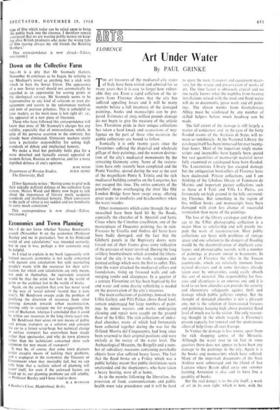coes and altarpieces is an onerous one and it is
hard to see how churches can provide the security and elementary safeguards against theft and damage which public galleries employ. But the thought of denuded churches is not a pleasant one, nor is the solution of latex-coated frescoes and paintings hanging high above potential flood level of much use to the visitor. The only reassur- ing thought in the whole tragedy is Florence's proven capacity for renewal and the spontaneous offers of help from all over Europe.
In Venice the damage is less severe, apart from the rich shopping centre of the Mercerie.
Although the water rose to six feet in some quarters there does not appear to have been any damage to the paintings in the city. Again it is the books and manuscripts which have suffered. Many of the important documents of the State Archive were submerged and the island of San Lazzaro where Byron idled away one summer learning Armenian is also said to have lost a quantity of books.
But the real danger is to the city itself, a work of art in its own right, which is now, with the
collapse of the dikes, temporarily defenceless and open to the sea. Also the unusual depth of flooding in the last few weeks may have upset the hydrographic equilibrium of the city. Venice is sinking at the rate of a foot a century due to the slow subsidence of the Paduan plain and a cor- responding rise in the sea level. Freak weather conditions could accelerate its decline.
The problem is an old one which the Venetians, with their periodic acque alti or unusual high tides sweeping over the city, are used to. The beautiful undulating floor of San Marco itself is a reflection of the subsiding foundations and occasional influx of the lagoon. The silting-up of the ancient ports of Adria and Ravenna should have shown the capricious nature of the sea long ago, but it took the sudden collapse of the Cam- panile in 1902 to prove that the Serenissima was not immune to the subtle and insidious move- ments of sea and subsoil. The solution for Venice lies not merely in more efficient dikes and sea defences but nearer home in the city planning committee itself. The Venice section of Italia Nostra has long been aware of the dangers of canal-filling and unsuitable building projects on unstable foundations. Centuries of living with and off the sea have shown the Venetians how to protect their art treasures, but the city itself needs tough measures if we are to continue enjoying this incomparable Renaissance city with its de- licate balance between stone and water.
THEATRE
Frumps
The Generals' Tea Party. (Jeannetta Cochrane Theatre.) IT is a sad fact that earnestness drives out style —and that those most sincerely dedicated to the new, the untried and the experimental in the theatre today seem, more often than not, to have absolutely no sense of that shapeliness, clarity and laconic penetration which marks all true contemporary innovators, from Beckett to the Beatles. And so we have a curious situation, in which the meek and mild commercial theatre can offer nothing in the way of conservatism, dinginess and true-blue frumpishness to compare with its non-commercial rivals. For real tat nowadays you have to go to your serious in- tellectual: Boris Vian's The Generals' Tea Party is a case in point. Supposedly a frolicsome jeu d'esprit masking a bitter truth about the late Algerian war, this humourless piece brings out a corresponding dowdy lumpishness in actors, director and designer—a lumpishness which, con- sidering that it is their avowed intent to put on new plays only, the Traverse company have so far avoided with amazing success.































 Previous page
Previous page